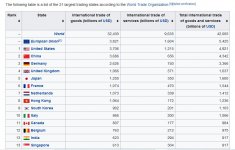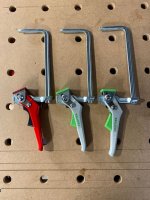Alex said:RussellS said:And Amazon sells lots of Chinese and Vietnamese and Thailand and Taiwan and Philippine stuff. If they only sold USA made stuff, their sales would be miniscule. And they would only employ a few hundred people at most. Or less. Maybe ten people in total.
Amazon was already a billion dollar business when they only sold books, were it started. I think those books weren't made in Asia.
I sure hopes this works. First time ever trying to quote prior posts inside a post and writing in between!!!!
Amazon started mid 1994. Amazon goes public stock mid 1997. $160 million sales in 1997. $1.6 billion in 1999. Late 2002 they start selling other stuff on their website besides books. Yes the books were not printed in Asia. I checked some of my books on the shelves and they all say printed in the USA. You are The Netherlands. Were your books printed in The Netherlands? Or were they printed in a foreign country and imported?
Alex said:RussellS said:So you would have tens and tens and tens of thousands of unemployed Amazon people without jobs if Amazon did not sell Chinese stuff. Would unemployed Amazon employees support local businesses?
Chinese stuff is only as cheap as it is because they have legalised what we call slave labour. If our markets weren't flooded with products made by slave labour, we would have to produce those products locally, and that would yield a lot more jobs for local people, who could then in turn support local businesses.
Producing products locally? Festool is made in Germany, not Netherlands. Assume not made by slaves so its OK to buy Festool in Netherlands. Telephones and computers and televisions are more or less only made in China or SE Asia. Legalized slave labor down there. Do you have any companies in Netherlands or western Europe who could make all the phones, computers, TVs that Europe wants to buy? And would they have any spare capacity to make them for the USA? And at what price could they make them? Cell phones here are a few hundred if you buy them unrestricted so you can use them with any network. TVs close to $1000 for the huge LCD screen ones now. Laptops under $1000. I only have one of each. But couples will have two phones and two computers. Add kids in and you get a phone for every kid and maybe a couple extra computers and TVs too. Do you want to spend $3000 for a phone? $2000 for a TV? $8000 for a computer? Times four if wife and two kids included. Would you have any money leftover to buy food for a family of four?
Alex said:By the way, Amazon employees sometimes make so little they qualify for food stamps. With their income, you think they're supporting a lot of other businesses anyway?
The internet stories I saw were about WalMart employees being on food stamps. But Amazon employees could be too. Food stamps are spent at the local grocery store or WalMart which sells groceries. So local support I guess. Yes I am for people earning more money to buy things they want and/or need. I support raising the minimum wage. But there is a conflict. I like getting stuff cheap too. If labor costs go up for everyone making stuff, then likely prices go up too. So I get less for my money. I want everyone to have more money. But its kind of a danged if you do, danged if you don't paradox. Me AND You benefit greatly from having legalized slaves in SE Asia make us stuff like phones, laptops, TVs, etc.



